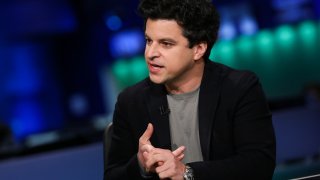
April is Financial Literacy Month and CNBC is featuring advice from our contributors and frequent guests. Here's how they think about financial literacy and its impact on their lives and future generations of American consumers, savers and investors.
Noah Kerner is the co-founder and CEO of Acorns, a micro-investing app that helps users save and invest their money.
Kerner, who graduated with a degree in economics from Cornell University, learned about money — and that all people should learn about money from an early age — when he was 17 and working as a bank teller.
Get Connecticut local news, weather forecasts and entertainment stories to your inbox. Sign up for NBC Connecticut newsletters.
"I went through all this training to learn about how to properly serve customers and explain money to customers and help them manage their money, and that educational experience, for me, was unbelievably important and invaluable," Kerner says. "And I actually think if everybody in their teenage years or even before could go through the process of learning how to be a bank teller and learning how to help people with their money, that would make them much more effective at managing their own money."
A lot of people first learn about money when they get their first job. As a child, Bob Greifeld, who would go on to become the chairman of Nasdaq, learned that working hard in an early job can teach lessons that last a lifetime. He had a job that Warren Buffett also once had.
Money Report
"As a young child, I learned about money by having a paper route. I mean, it is certainly in many ways, a microcosm of all the business lessons I had throughout my life ... to be involved with money, to having profit from your hard work, is a fundamental life lesson. And I'm so glad that I have it."
CNBC contributor Sarat Sethi is a strong believer in personal finance classes for every student in school, and he is not alone. Earlier this week, Georgia became the latest state to require high school students to take a personal finance course in order to graduate.
"I am a strong believer that a personal finance class should be given to every student in high school. It should be given to every student in college. And I think every consumer needs to understand what personal finance means for them, what it means for them currently and what it could mean for them in the future."
Ana Valdez's financial literacy journey didn't start until a little later, when she arrived in the U.S. at the age of 28. The entrepreneur grew up and was educated in Mexico City. Coming to the U.S. meant that Valdez had access to capital and other sources of growth, but to understand the deals she was signing, it was imperative that Valdez became financially literate.
"There were possibilities of growing my business ... access to capital, from banks, all the way to VCs, and all the sources of growth that could empower a fantastic idea that probably wouldn't have happened in another country."
Even if it's been happening past childhood, the pandemic led many younger Americans to invest in the markets for the first time, and now they are getting their first lesson in the fact that markets don't only go up. A popular face on CNBC's "Halftime Report," Joe Terranova knows firsthand how important financial literacy is to being a successful investor, which takes on even more importance as market volatility has risen and the gains from the pandemic boom decline.
Novice investors need to be aware of, and understand, the risks, especially at times like these.
"Financial literacy has a positive impact on Wall Street. It creates market efficiency. It provides liquidity and without question, it creates strong demand for investable assets, both traditional and nontraditional. In addition to that, it creates an awareness for leverage and risk and an investor that better understands risk and leverage within the markets is a more successful investor."
April has been a wild ride for markets. The volatility can frighten even the most seasoned and experienced investors. CNBC contributor Steve Grasso agrees with Terranova that in addition to understanding the risks that are inherent in stock investing, being financially literate allows investors to take advantage of volatile market situations.
"During times of volatility, or selloffs, there's money to absorb those selloffs. And they're not as dramatic as they would otherwise be if you didn't have that liquidity in the overall marketplace. So, Wall Street thrives on capital, the more capital, the healthier Wall Street is. The more financial literate people are, the more capital Wall Street gets."
SIGN UP: Money 101 is an 8-week learning course to financial freedom, delivered weekly to your inbox. For the Spanish version Dinero 101, click here.
CHECK OUT: How the Savvy Couple brings in $35,000/month or more in mostly passive income: 'Last year, we did $425,000 in revenue' with Acorns+CNBC
Disclosure: NBCUniversal and Comcast Ventures are investors in Acorns.






